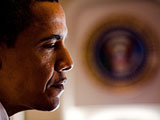Costs of War: Safety in Aggression?
By Shaun Waterman for ISN
The external pagepollcall_made, conducted by veteran Democratic external pagepolitical consultants Stan Greenberg and Jeremy Rosnercall_made, found that President Obama had strong personal approval ratings among voters in most areas of national security - higher indeed than his approval rating overall, which was 47 percent approving and 48 percent disapproving.
Conducted in late February, the poll surveyed 851 adults who voted in 2008 and said they were likely to do so again in 2010.
More than half of the likely voters approved of the president’s handling of Afghanistan (58 percent to 37 percent disapproving); national security (57 percent to 40); “leading America’s military” (57 percent to 38); fighting terrorism (54 percent to 41); and Iraq (54 percent to 40).
These numbers, though still strong, are down from the 60 percent plus territory they were in when the pollsters ran their survey in May last year.
Nonetheless, the president’s approval ratings are currently in negative territory on only two national security issues: Iran (42 percent approving to 49 percent disapproving) and the “prosecution and interrogation of terrorism suspects.”
"Whereas a majority of the public approves of the job President Obama is doing in most aspects of national security, a 51 to 44 percent majority of likely voters disapproves of his efforts on the prosecution and interrogation of terrorism suspects," the pollsters found.
They attribute this “at least in part, [to] strong Republican attacks on some specific policies and actions,” including their relentless drumbeat of criticism on the Obama administration’s treatment of the accused Christmas Day underpants bomber. Republicans have chastised officials for the decision to read Umar Farouk Abdulmutallab his Miranda rights and prosecute him in criminal court, rather than as an enemy combatant.
Bad news for the party
But the really bad news in the polling data is not for the president, but for the Democratic Party.
"When the questions move beyond the president to Democrats generally, we see that the public once again has real and rising doubts about the Democrats' handling of national security issues, as compared to their faith in Republicans," the pollsters state.
This imbalance among voters on the issue is so marked and long-standing that it has a name. The security gap, “has roots stretching back to Vietnam, [and] was as wide as 29 points earlier in the decade,” note the pollsters.
In the wake of the Bush administration’s disastrous adventure in Iraq and growing dissatisfaction with progress in the war on terror, that gap began to close, and “As public hopes about the Obama presidency rose and peaked, the gap all but vanished.”
Last May, the pollsters found Democrats almost tied with Republicans (41 to 43 percent) on the question of which party would do a better job on national security.
But now the gap has re-opened, with Democrats trailing Republicans by 17 points (33 to 50 percent) on that same question.
“Republicans have too easily put Democrats and progressives on the defensive with charges of lenient or risky handling of terrorist suspects,” the pollsters write, arguing that “It is a losing public strategy to argue this [issue] on grounds of constitutional principles.”
Instead, they urge the administration to “stress toughness and results,” emphasizing in public messaging how “Obama has stepped up the fight [against terrorism] and, using Predator plane attacks and Special Forces, we have captured or killed hundreds of al-Qaida and their allies” since taking office.
They accompany this advice with a rather pro forma disclaimer. “The president’s and Democrats’ standing on national security depends, above all else, on sensible policy and good results,” they acknowledge. “Polling does not identify the actions that will make America safer.”
Quite. And indeed, polling does not - in this case - even identify properly the territory on which the argument about what will make America safer is taking place.
It is clearly true that the relentless Republican attacks on the handling of the accused Christmas Day bomber have had an impact - though this may say more about the effectiveness of attack politics than any weakness the president has on the issue.
And the pollsters are right to posit that one line of argument Democrats have taken - pointing out that the Bush administration treated the shoe bomber Richard Reid in the same fashion - “sounds political, and produces a weak response” among voters.
Missing the point
But the dissatisfaction of voters with the administration’s interrogation and detention policy runs a lot deeper than concern about that one case. As previously noted in this column, consistent polling data from different organizations over several years shows that a clear majority of Americans favor the use on terror suspects of ‘aggressive’ interrogation techniques like water-boarding - which president Obama has banned as torture.
On this question, it would seem the voters simply disagree with the president on the issue.
But the pollsters’ admonition to talk tough assumes Democrats can close the security gap by making voters forget that fact. It completely ignores the argument that the president has tried to make - and that Democrats in general desperately need to win with voters - that abiding by constitutional principles in the treatment of suspected terrorists actually makes the US safer.
“Our nation is stronger and more secure when we deploy the full measure of both our power and the power of our values - including the rule of law," external pageObama told staff at the CIAcall_made last year.
But though the president has made the case eloquently, he has not done so often enough. And Democratic lawmakers - at a cost they may only discover in the November elections - have by and large failed to even try to make the argument.

